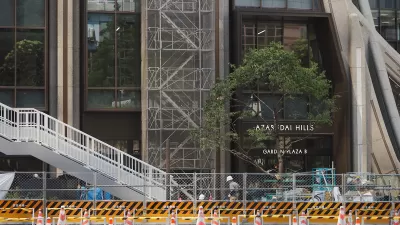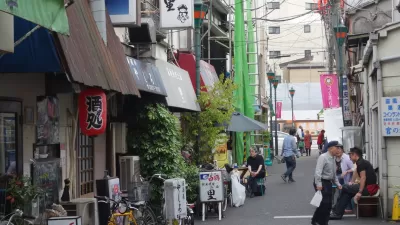In this compelling essay, authors Matias Echanove and Rahul Srivastava take a look at Tokyo's post-war development and explore how lessons learned from its unplanned growth may be useful for other rapidly urbanizing Asian cities today.
In a recent addition to the Rockefeller Foundation's Informal City Dialogues, Matias Echanove and Rahul Srivastava show how user involvement, incremental development, and the integration of neighborhoods into a larger urban system, led to an "economic miracle" in Tokyo. They illustrate how this "Tokyo Model" could be applied in cities and slums in the developing world, potentially redefining "good urbanism" in the 21st century. The authors delve deeply into the Tokyo's unplanned history and features today, which, in fact, “[resemble] the low-rise, high-density habitats one normally associates with cities like Mumbai and Manila”. They affirm that “[t]his is incremental Tokyo, the foundation upon which the world’s most modern city is built.”
They further explain that, “Tokyo was built with loose zoning rules to become a fantastically integrated mixed-use city, where tiny pedestrian streets open up to high-speed train lines.” And when considering Tokyo's post-World War II reconstruction, they explain how “a collection of semi-autonomous neighborhoods” came together through self-reliance, especially in the provision of new housing. Through this, “[l]ocal construction practices, family-owned businesses (including manufacturing units), flexibility of land uses and live-work arrangements created a shadow, homegrown economy that went hand-in-hand with the city’s global-scale, export-orientated industrial development.” They claim that it was this decentralized, organic development that “informed the city's economic success”, challenging today's more commonly accepted narrative that “large-scale, foreign investment” leads to greater social and economic prosperity in developing cities.
The authors point to how mixed-uses, and multi-functional living spaces abound in Mumbai, making the assertion that, “Mumbai’s tool-house is also an avatar of postwar Tokyo’s home-based manufacturing unit.” They conclude that Dharavi, one of Mumbai's notorious slums, could follow Tokyo's path and "bloom into a world-class manufacturing hub.” They warn, however, that any future prosperity “depends on [Mumbai's] local authorities heeding the lessons of Tokyo,” and call on them to jettison policies of slum-clearing and redevelopment, which are currently the norm.
FULL STORY: When Tokyo Was a Slum

Maui's Vacation Rental Debate Turns Ugly
Verbal attacks, misinformation campaigns and fistfights plague a high-stakes debate to convert thousands of vacation rentals into long-term housing.

Planetizen Federal Action Tracker
A weekly monitor of how Trump’s orders and actions are impacting planners and planning in America.

In Urban Planning, AI Prompting Could be the New Design Thinking
Creativity has long been key to great urban design. What if we see AI as our new creative partner?

King County Supportive Housing Program Offers Hope for Unhoused Residents
The county is taking a ‘Housing First’ approach that prioritizes getting people into housing, then offering wraparound supportive services.

Researchers Use AI to Get Clearer Picture of US Housing
Analysts are using artificial intelligence to supercharge their research by allowing them to comb through data faster. Though these AI tools can be error prone, they save time and housing researchers are optimistic about the future.

Making Shared Micromobility More Inclusive
Cities and shared mobility system operators can do more to include people with disabilities in planning and operations, per a new report.
Urban Design for Planners 1: Software Tools
This six-course series explores essential urban design concepts using open source software and equips planners with the tools they need to participate fully in the urban design process.
Planning for Universal Design
Learn the tools for implementing Universal Design in planning regulations.
Appalachian Highlands Housing Partners
Gallatin County Department of Planning & Community Development
Heyer Gruel & Associates PA
Mpact (founded as Rail~Volution)
City of Camden Redevelopment Agency
City of Astoria
City of Portland
City of Laramie





























